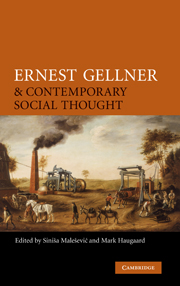Book contents
- Frontmatter
- Contents
- Notes on contributors
- Acknowledgements
- Introduction: an intellectual rebel with a cause
- Part I Civil society, coercion and liberty
- 1 Ernest Gellner on liberty and modernity
- 2 Predation and production in European imperialism
- 3 Power, modernity and liberal democracy
- 4 Gellner versus Marxism: a major concern or a fleeting affair?
- Part II Ideology, nationalism and modernity
- Part III Islam, postmodernism and Gellner's metaphysic
- Index
- References
1 - Ernest Gellner on liberty and modernity
Published online by Cambridge University Press: 22 September 2009
- Frontmatter
- Contents
- Notes on contributors
- Acknowledgements
- Introduction: an intellectual rebel with a cause
- Part I Civil society, coercion and liberty
- 1 Ernest Gellner on liberty and modernity
- 2 Predation and production in European imperialism
- 3 Power, modernity and liberal democracy
- 4 Gellner versus Marxism: a major concern or a fleeting affair?
- Part II Ideology, nationalism and modernity
- Part III Islam, postmodernism and Gellner's metaphysic
- Index
- References
Summary
Ernest Gellner was in many respects a late Enlightenment thinker. His central theme, like Montesquieu, Hume and de Tocqueville, was summarised in the title of one of his last books, The Conditions of Liberty. In this chapter I will summarise what he thought those conditions were. I will then look at three areas where his interpretation can be expanded or challenged. The origins of civil society are somewhat neglected in Gellner's scheme and I shall examine one theory to explain how, against the odds, a new kind of civilisation emerged. The fragility of the Open Society in the aftermath of 9/11 and the ‘war on terror’ was not something he could address, and I shall do so briefly here. Finally, I shall consider whether there is an alternative to the type of divided modernity which Gellner both defended and mourned.
Gellner believed that liberty arose out of the central characteristic of modernity, namely the separation of spheres or institutions. The pursuit of power (politics), wealth (economics), social warmth (kinship) and meaning (religion) had become separated and balanced each other. ‘The really fundamental trait of classical capitalism is that it is a very special kind or order in that the economic and the political seem to be separated to a greater degree than in any other historically known social form’ (Gellner 1980: 285). None of the institutions is dominant, there is no determining infrastructure, but a precarious and never stable balance of power.
- Type
- Chapter
- Information
- Ernest Gellner and Contemporary Social Thought , pp. 31 - 49Publisher: Cambridge University PressPrint publication year: 2007
References
- 5
- Cited by



